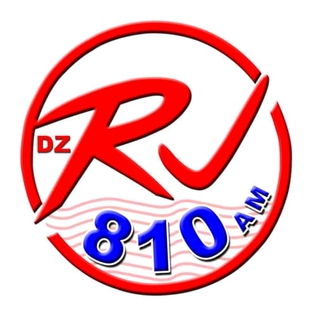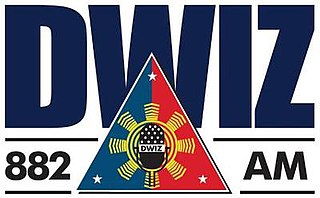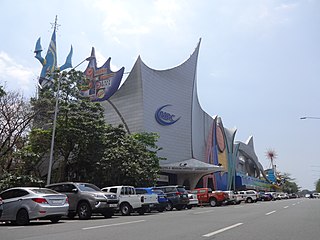
Pirate radio or a pirate radio station is a radio station that broadcasts without a valid license.
The strict definition of a pirate radio station is a station that operates from sovereign territory without a broadcasting license, or just beyond the territorial waters of a sovereign nation from on board a ship or other marine structure with the intention of broadcasting to that nation without obtaining a broadcasting license from that nation.

DWRR-FM, broadcasting as MOR 101.9, was a commercial radio station owned by ABS-CBN Corporation and previously operated by the Manila Radio division and the Star Creatives Group. Broadcast live throughout the Philippine archipelago, and throughout the world via The Filipino Channel (TFC), it was the flagship FM station of MOR Philippines and the number 1 FM radio station in Metro Manila, Mega Manila as well as the entire Philippines according to KBP Radio Research Council. The studios were located at ABS-CBN Broadcasting Center, Sgt. Esguerra Ave., corner Mo. Ignacia Ave., Diliman, Quezon City, and the station's 22.5 kW FM stereo transmitter was located at the Eugenio Lopez Center, Santa Cruz, Sumulong Highway, Antipolo, Rizal.

DZRJRadyo Bandido is a radio station owned and operated by Rajah Broadcasting Network through its licensee Free Air Broadcasting Network, Inc. Its studio is located at the 2nd Floor, Ventures Building 1, General Luna St. cor. Makati Ave., Poblacion, Makati, while its transmitter is located along KM 21, Quirino Highway, Brgy. Pasong Putik, Novaliches, Quezon City.

DWIZ is a radio station owned and operated by Aliw Broadcasting Corporation, a subsidiary of the ALC Group of Companies. It serves as the flagship station of the newly established DWIZ network. The station's studio is located at the 5th Floor, Citystate Centre, 709 Shaw Boulevard, Brgy. Oranbo, Pasig, and its transmitter is located at Osmeña St., Brgy. Pag-Asa, Obando, Bulacan.

DZECRadyo Agila is a radio station owned and operated by the Eagle Broadcasting Corporation in the Philippines. The station's studio is located at EBC Bldg., 25 Central Ave., Diliman, Quezon City, and its transmitter is located at Brgy. Paliwas, Obando, Bulacan. The station operates daily from 4:00 AM to 12:00 MN.

Manila Broadcasting Company (MBC) is a radio and television network in the Philippines. MBC is currently owned by the FJE Group of Companies of Fred J. Elizalde, which also operates hotels and Pasay-based amusement park Star City. Its AM flagship network, DZRH is the oldest radio station in the country while its FM flagship network, Love Radio is the top station in FM radio ratings in Metro Manila and several key cities.

NU 107 (DWNU) was a radio station in Mega Manila that played mainly rock music. It was owned by Progressive Broadcasting Corporation. The station's last studio was located at the ground floor of AIC Gold Tower, F. Ortigas Jr. Road, Ortigas Center, Pasig.

The Presidential Broadcast Service - Bureau of Broadcast Services (PBS-BBS), is a state radio network owned by the Philippine government under the Presidential Communications Office (PCO).

DZCE-TV is a television station in Metro Manila, Philippines, serving as the flagship of the INCTV network. Owned and operated by Christian Era Broadcasting Service International, a broadcast ministry of the Iglesia ni Cristo, the station maintains studio and transmitter facilities located at Milton Hills Subdivision, Redeemer St., Brgy. New Era, Quezon City.

DZMERadyo Uno is a radio station owned and operated by Capitol Broadcasting Center in the Philippines. The station's studio is located at Unit 1802, 18/F, OMM-Citra Building, San Miguel Ave., Ortigas Center, Pasig and its transmitter is located at #78 Flamengco St., Brgy. Panghulo, Obando, Bulacan. This station operates daily from 4:00 AM to midnight.

Nation Broadcasting Corporation (NBC) is a Philippine radio and television Broadcast company established in 1963. As of December 2013, NBC is a subsidiary of MediaQuest Holdings, Inc. under the PLDT Beneficial Trust Fund. NBC operates primarily involved in radio and television broadcasting with affiliate by sister network TV5 Network, Inc. and its corporate offices and studios are located at the TV5 Media Center, Reliance cor. Sheridan Sts., Mandaluyong, Metro Manila, Philippines.
Hot FM Network was a broadcast radio network in the Philippines owned by Manila Broadcasting Company under Radyo Natin Network. Its headquarters are located at Star City Complex, Pasay. Although, Hot FM network is owned and operated by different small media companies and colleges, while its stations in Cebu, Dagupan and Zamboanga, are fully owned and operated by MBC itself and later rebranded as YES FM. Since 2016, however, most of the Hot FM stations dropped the said brand and replaced with the Radyo Natin brand, resulting the network unofficially dissolved.
Mix FM was an unlicensed radio station in Ottawa, Ontario, Canada. The station broadcast as a pirate radio station on several frequencies, most notably on 91.9 FM. The station was "forced off the air" soon after midnight on December 14, 2009, however, the station later signed back on the air 10 days later. The broadcast of Mix FM was forcibly shut down by Industry Canada on January 15, 2010, although the station continues to operate a podcast stream online. The operator of the station was subsequently found guilty of violating the Radiocommunication Act.
Call signs in Asia are rarely used to identify broadcast stations. In most Asian countries, broadcast stations use other forms of identification. Japan, South Korea, Indonesia, the Philippines and Taiwan are exceptions to this rule. Amateur radio stations in India, Pakistan, Korea and Japan are allocated call-signs.
Broadcast media is being utilized by the Members Church of God International (MCGI), an international Christian religious organization with headquarters in the Philippines, to preach the gospel and expand internationally. The church is producing religious programs in different languages, aired in various countries, by acquiring time slots on several television stations. The church also maintains its own radio and television network for its 24/7 terrestrial, satellite and internet broadcasts.

DWFO, broadcasting as 87.5 Republika FM1, is a radio station owned and operated by the Presidential Broadcast Service, the broadcast arm of the Presidential Communications Group. Its studios and transmitter are located at the 4th Floor, Philippine Information Agency Building, Visayas Ave., Quezon City. The station operates on terrestrial radio Mondays to Saturdays from 5:00 AM to 12:00 MN and Sundays from 5:00 AM to 9:00 PM, while it operates 24 hours a day on its online platforms.

DWKY, broadcasting as 91.5 Win Radio, is a radio station owned by Mabuhay Broadcasting System and operated by Manuelito "Manny" Luzon's ZimZam Management, Inc. It serves as the flagship station of the Win Radio Network. The station's studio and transmitter are located at the 40th Floor, Summit One Tower, Shaw Blvd., Mandaluyong.












